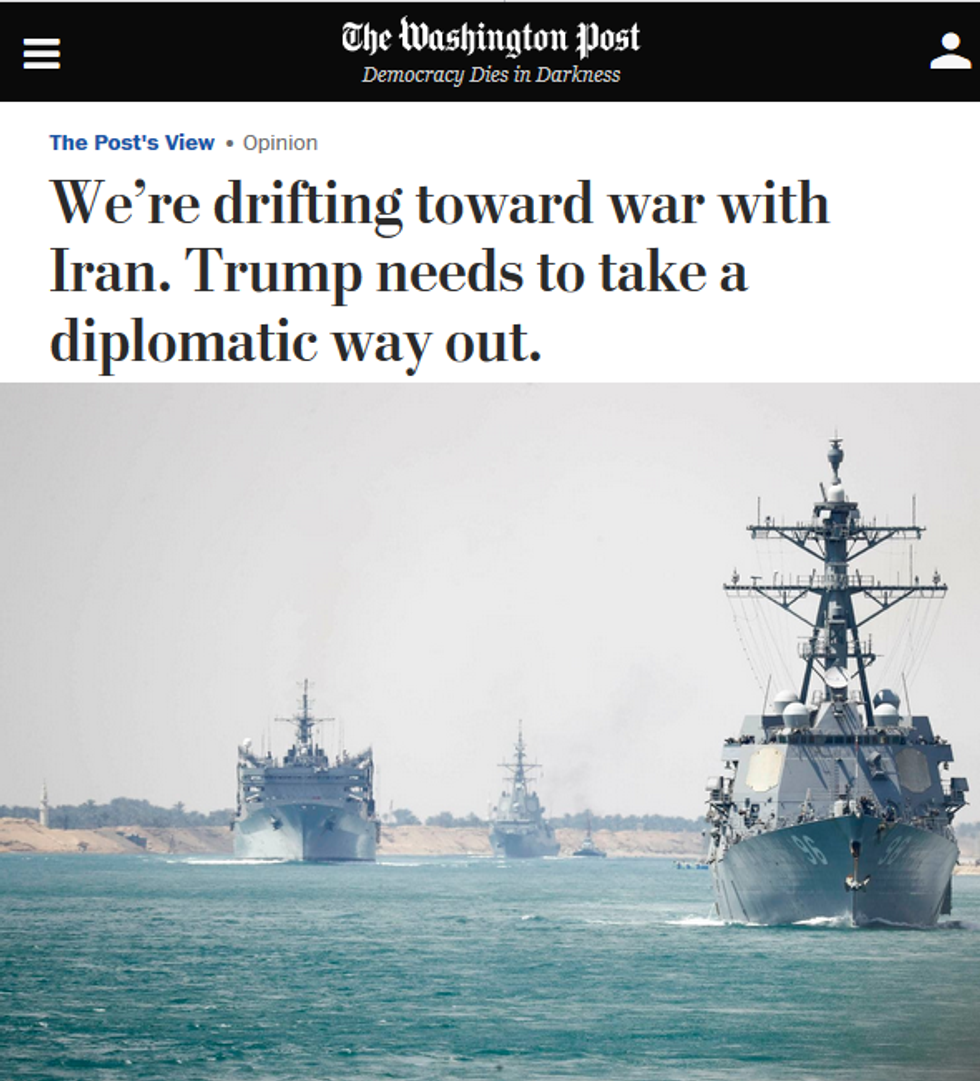
National Security Advisor John Bolton has been pushing for war on Iran since the George W. Bush administration, and has already asked the Pentagon to plan for a military strike at least once. (Photo: Andrew Harrer/Bloomberg via Getty Images)
Corporate Media Setting Up Iran as New 'Threat' That Must Be Confronted
If we can still call things "surreal," that would describe watching corporate media do the same things they did in the run-up to the Iraq War
The Washington Post editorial's headline (5/14/19) had the U.S. "drifting" toward war with Iran--another example, as analyst Nima Shirazi quipped, of the "world's superpower somehow having no agency over its own imperialism."

If we can still call things "surreal," that would describe watching corporate media do the same things they did in the run-up to the Iraq War, things they later disavowed: the credulous repetition of administration claims about the supposed threat; the reliance, for interpretation of "intelligence," on officials with well known records for manipulating intelligence; the stenographic reporting of 'troubling' actions by the enemy state, that later have to be walked back.
A May 13 New York Times piece led with the statement that Acting Defense Secretary Patrick Shanahan had "presented an updated military plan that envisions sending as many as 120,000 troops to the Middle East should Iran attack American forces or accelerate work on nuclear weapons, administration officials said." As researcher Derek Davison reminds, in a piece for LobeLog 5/14/19), there is, as the Times has acknowledged on other occasions, no evidence that Iran is working on nuclear weapons, at whatever pace.
Later, the piece says:
Some senior American officials said the plans, even at a very preliminary stage, show how dangerous the threat from Iran has become. Others, who are urging a diplomatic resolution to the current tensions, said it amounts to a scare tactic to warn Iran against new aggressions.
So that's both sides; Iran is a dangerous threat or it needs to be prevented from "new aggressions," though the piece doesn't name any previous ones. Indeed, the Times quotes and leaves unremarked the claim from a National Security Council spokesperson that "the president has been clear, the United States does not seek military conflict with Iran... However, Iran's default option for 40 years has been violence"--a frankly mind-boggling statement that surely warranted more than frictionless transmission.
At the very end of the article, Davison reports, the Times throws in that National Security Advisor John Bolton has been pushing for war on Iran since the George W. Bush administration, and has already asked the Pentagon to plan for a military strike at least once, before these new supposed "troubling" moves from the country. But by that point, readers may have concluded that Iran is an emboldened rogue state, threatening the U.S. and pursuing nuclear weapons--and the revelation that Bolton is trying to drum up a war with them might sound less unreasonable.
An Urgent Message From Our Co-Founder
Dear Common Dreams reader, The U.S. is on a fast track to authoritarianism like nothing I've ever seen. Meanwhile, corporate news outlets are utterly capitulating to Trump, twisting their coverage to avoid drawing his ire while lining up to stuff cash in his pockets. That's why I believe that Common Dreams is doing the best and most consequential reporting that we've ever done. Our small but mighty team is a progressive reporting powerhouse, covering the news every day that the corporate media never will. Our mission has always been simple: To inform. To inspire. And to ignite change for the common good. Now here's the key piece that I want all our readers to understand: None of this would be possible without your financial support. That's not just some fundraising cliche. It's the absolute and literal truth. We don't accept corporate advertising and never will. We don't have a paywall because we don't think people should be blocked from critical news based on their ability to pay. Everything we do is funded by the donations of readers like you. Will you donate now to help power the nonprofit, independent reporting of Common Dreams? Thank you for being a vital member of our community. Together, we can keep independent journalism alive when it’s needed most. - Craig Brown, Co-founder |
The Washington Post editorial's headline (5/14/19) had the U.S. "drifting" toward war with Iran--another example, as analyst Nima Shirazi quipped, of the "world's superpower somehow having no agency over its own imperialism."

If we can still call things "surreal," that would describe watching corporate media do the same things they did in the run-up to the Iraq War, things they later disavowed: the credulous repetition of administration claims about the supposed threat; the reliance, for interpretation of "intelligence," on officials with well known records for manipulating intelligence; the stenographic reporting of 'troubling' actions by the enemy state, that later have to be walked back.
A May 13 New York Times piece led with the statement that Acting Defense Secretary Patrick Shanahan had "presented an updated military plan that envisions sending as many as 120,000 troops to the Middle East should Iran attack American forces or accelerate work on nuclear weapons, administration officials said." As researcher Derek Davison reminds, in a piece for LobeLog 5/14/19), there is, as the Times has acknowledged on other occasions, no evidence that Iran is working on nuclear weapons, at whatever pace.
Later, the piece says:
Some senior American officials said the plans, even at a very preliminary stage, show how dangerous the threat from Iran has become. Others, who are urging a diplomatic resolution to the current tensions, said it amounts to a scare tactic to warn Iran against new aggressions.
So that's both sides; Iran is a dangerous threat or it needs to be prevented from "new aggressions," though the piece doesn't name any previous ones. Indeed, the Times quotes and leaves unremarked the claim from a National Security Council spokesperson that "the president has been clear, the United States does not seek military conflict with Iran... However, Iran's default option for 40 years has been violence"--a frankly mind-boggling statement that surely warranted more than frictionless transmission.
At the very end of the article, Davison reports, the Times throws in that National Security Advisor John Bolton has been pushing for war on Iran since the George W. Bush administration, and has already asked the Pentagon to plan for a military strike at least once, before these new supposed "troubling" moves from the country. But by that point, readers may have concluded that Iran is an emboldened rogue state, threatening the U.S. and pursuing nuclear weapons--and the revelation that Bolton is trying to drum up a war with them might sound less unreasonable.
The Washington Post editorial's headline (5/14/19) had the U.S. "drifting" toward war with Iran--another example, as analyst Nima Shirazi quipped, of the "world's superpower somehow having no agency over its own imperialism."

If we can still call things "surreal," that would describe watching corporate media do the same things they did in the run-up to the Iraq War, things they later disavowed: the credulous repetition of administration claims about the supposed threat; the reliance, for interpretation of "intelligence," on officials with well known records for manipulating intelligence; the stenographic reporting of 'troubling' actions by the enemy state, that later have to be walked back.
A May 13 New York Times piece led with the statement that Acting Defense Secretary Patrick Shanahan had "presented an updated military plan that envisions sending as many as 120,000 troops to the Middle East should Iran attack American forces or accelerate work on nuclear weapons, administration officials said." As researcher Derek Davison reminds, in a piece for LobeLog 5/14/19), there is, as the Times has acknowledged on other occasions, no evidence that Iran is working on nuclear weapons, at whatever pace.
Later, the piece says:
Some senior American officials said the plans, even at a very preliminary stage, show how dangerous the threat from Iran has become. Others, who are urging a diplomatic resolution to the current tensions, said it amounts to a scare tactic to warn Iran against new aggressions.
So that's both sides; Iran is a dangerous threat or it needs to be prevented from "new aggressions," though the piece doesn't name any previous ones. Indeed, the Times quotes and leaves unremarked the claim from a National Security Council spokesperson that "the president has been clear, the United States does not seek military conflict with Iran... However, Iran's default option for 40 years has been violence"--a frankly mind-boggling statement that surely warranted more than frictionless transmission.
At the very end of the article, Davison reports, the Times throws in that National Security Advisor John Bolton has been pushing for war on Iran since the George W. Bush administration, and has already asked the Pentagon to plan for a military strike at least once, before these new supposed "troubling" moves from the country. But by that point, readers may have concluded that Iran is an emboldened rogue state, threatening the U.S. and pursuing nuclear weapons--and the revelation that Bolton is trying to drum up a war with them might sound less unreasonable.

